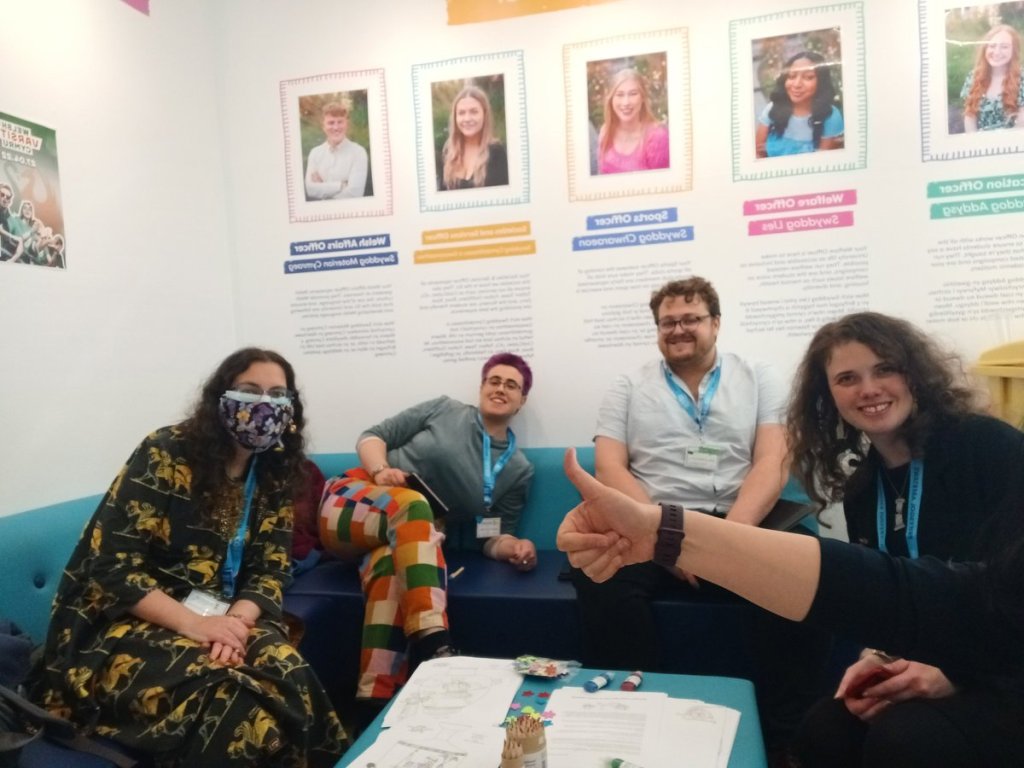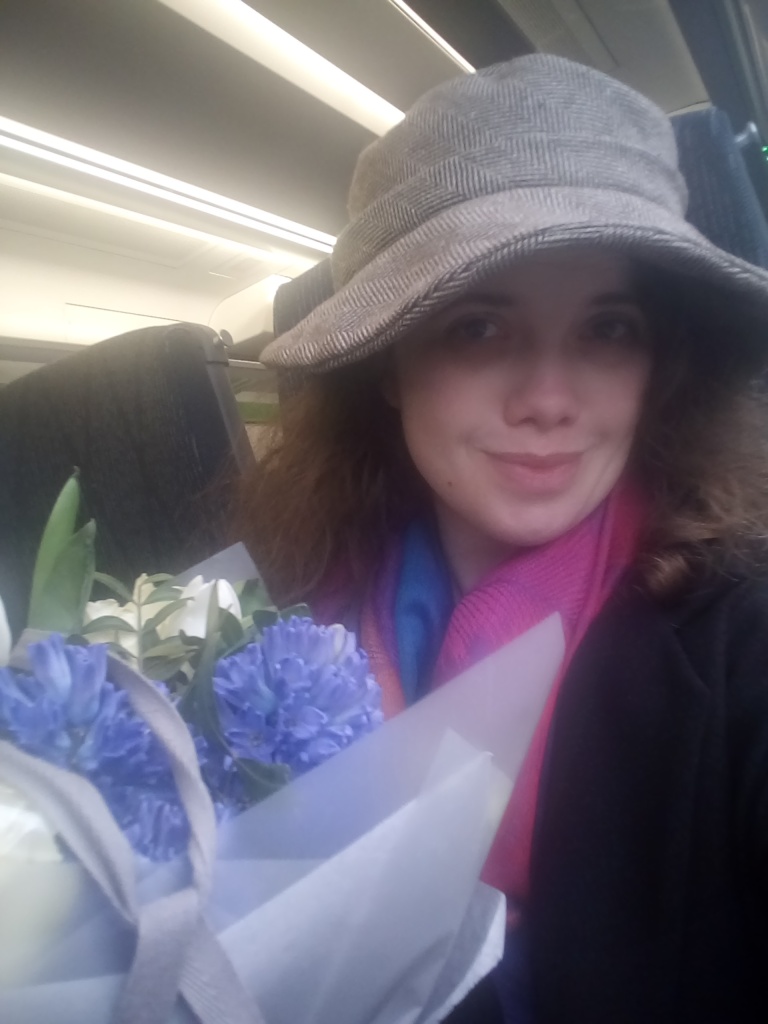It’s taken me longer than I expected to finish writing this post, even though I wrote most of it on the train 11 days ago. I knew that a round trip of over 700 miles on multiple forms of public transport, right at the start of the Easter holidays, would be gruelling; and I knew that several long days of being around people would exhaust me, particularly given the last few years of limited socialising. I knew that presenting at a big conference – which is something I’ve never done before due to my long-standing fear of public speaking – would take some recovering from. And yet… somehow I expected that I’d just be able to launch myself back into everything the moment I got back, as though nothing had happened.
Strangely enough, that hasn’t been going too well.
So here’s my belated and slightly fuzzy attempt to report back, as promised, on events. Apologies for anything that doesn’t make sense – I can’t even keep track of what day it is this week!
My first experience of a Classical Association Conference has certainly been interesting! For someone who prefers to lurk in the background and do things behind the scenes, having so much attention focused on me has been a shock to the system. But what a nice one!
I’m sitting here on the train (my second train of three, still many hours from home) surrounded by flowers and chocolates, with kind messages flooding in from so many people that I can’t answer them all. Days like this don’t happen very often – not to anybody, I suppose, and certainly not to me.
My first day at the conference, on Saturday, was lovely – I met some of my fellow panel members in person for the first time, and helped out with staffing the Neurodiversity stand. In effect, that was just a cosy corner of the foyer where people could come when everything got too much, to sit quietly or colour in or read something. It was surprising how many people stopped by for a quiet break.

We set up the area to promote our Neurodiverse Classics panel, so its focus was on neurodiversity; but to be honest I think that a quiet space at a big event serves everybody. The conference was pretty intensive, running 9am to 6pm with multiple panels and breaks that involved lots of crowds and chatting over coffee. Most hotels were a bus ride away, so popping back to your room for a break wasn’t an option for most people. In a situation like that, a space to sit quietly makes a lot of sense, and it would be good to see it becoming a formal feature of in-person conferences.
Another change we’re proposing to in-person conferences is a sticker system we’ve developed at Asterion, through the Signum Project. It’s a very simple system, used in some other sectors and disciplines, which cuts down on the social stress of a big in-person event by allowing people to state (by means of a coloured sticker) whether they’re happy to chat with anyone, or talk to friends only, or avoid chatting and networking altogether. The system is cheap, unobtrusive, and could make a huge difference to people who experience social awkwardness or anxiety. You can take a look at the project here:
I also spent a fair bit of time lurking around the bookstalls. Did you know that there are bookstalls at big conferences? With discounts? And freebies? It was like catnip. My bags are much heavier now than they were when I left home.

I also attended several pedagogy panels. In part, this is because I have a strong interest in teaching: both the practice of it and the theory. After an MEd and an MA in Online and Distance Education, both part-time over 3 years, I feel like I’ve spent a lot of the last two decades reading and writing about Education. So panels which combine teaching discussion with Classics are very much up my street. But that’s not the only reason why I kept going to the pedagogy panels. I went because the speakers were so good! There was laughter, discussion, exchanges of ideas, and a real sense of community. Teachers are the best. A high spot was being mentioned in Laura Jenkinson-Brown’s paper about her Choose Your Own Odyssey game, which I absolutely loved when I got the chance to test out an early version. That’s definitely something I’ll promote when it’s released!

One of the absolute highlights of the day for me was the object handling session from the Egypt Centre. I got to sit at a table – with gloves on – and have these wonderful things brought to me to hold. It was a special still moment in a hectic day.

At the end of the day – after dinner with Asterion board member Alexandra Morris, former CA President Mari Williams, and lots of other fascinating people – I was more tired than I can remember being. So tired, in fact, that when I finally sat down in my hotel room to write some material for the next day, I promptly fell asleep and didn’t wake up until 10 mins before breakfast the next morning.

The Sunday was even more intense, and certainly more stressful for me. We had a 2-hour Neurodiversity Round Table in the afternoon, based on the videos we recorded and hosted on the Asterion website. But it was to be a hybrid round table, with remote participants (both speakers and listeners) as well as people in the room. Would it work? How would it work? What could we do to make it work for everybody, in a way that would fit their needs?
In the event, it went smoothly. There were no hitches in the technology side of things, thanks to the calm and competent student volunteers. In the room we could hear and see the online participants so clearly that it seemed like they were right there with us. People in the room and online had so many great questions and suggestions that we never even got as far as covering the material we prepared. It felt like two hours didn’t give us time even to scratch the surface. But the best thing was that a few people came up to us afterwards and thanked us for what we’re doing to make them visible as neurodivergent people in Classics. That made all the stress worthwhile.

We’re going to keep our pre-recorded videos online for a while, so do feel free to continue the conversations in the comments. We have a long way to go and a lot to learn, and we need insights from as many people as we can reach.
The Sunday evening was very eventful. To begin with, the shuttle bus didn’t pick us up from outside the hotel as we were expecting; nor did all of the replacement taxis appear. So quite a few of us from the same hotel were late for the evening event at the Swansea Guildhall, and sadly missed a reading by Charlotte Higgins. Luckily, though, we were in time for the banquet, which was excellent!

After dinner it was time for the annual prizegiving. This was the second year of the CA Teaching Awards, and the winners were all extraordinary people making a huge difference in schools and communities. It was wonderful to meet the Working Classicists team, and to see George Connor (who also happens to be a student on the OU Classical Studies MA!) accept an award, based on the tremendous work he’s done to bring Classics into schools in Scotland. For me the best part was seeing my friend Laura Jenkinson-Brown (whom I only met in person for the first time this weekend!) honoured for Innovative Pedagogy, an award which she fully deserves for the incredible work she’s done over the years to develop engaging and entertaining resources for children studying Classics (although to be fair, her Greek Myth Comix material is a joy for students of any age!).


The lovely Working Classicists George and Miri, and Innovative Pedagogy winner Laura Jenkinson-Brown with Caroline Bristow, director of the Cambridge School Classics Project.
I was awarded an honour which I’m still struggling to process: the CA Prize, which is ‘awarded annually to the person whose work is felt to have raised the profile of Classics in the public eye’.
Previous winners of the CA Prize include Michael Scott, Mary Beard, Natalie Haynes and many other classicists who are far more in the public eye than I am, so I’m rather overawed by the company I find myself in. But it’s lovely to feel like the work I’ve been doing over the last few years has touched so many people.
Dr Arlene Holmes-Henderson, Outreach Officer for the Classical Association, made a very kind speech. She said: ‘The winner of this year’s prize is someone who works tirelessly to widen access to the study of the ancient world for learners of all ages.’ She talked about Comfort Classics, Asterion and the work I’ve done to widen access to Classics.
It was a bit startling to be noticed like that, and even stranger to stand up and make a speech myself! I used the opportunity to thank all the people – on Twitter, podcasts, blogs, YouTube and in all the places where Classics spreads through enthusiasm and shared interests, including here on this blog – who have inspired and encouraged me. I also said a big thank-you to the extraordinary students whose passion for Classics keeps me going.

I think it might take me a while to accept that they really did choose to give the prize to me, and that it wasn’t a mix-up with a less awkward classicist of the same name (unlikely, I grant you). After all, I tend to go out of my way NOT to be visible! In over 150 Comfort Classics interviews, I realise that I never wrote one myself, and I still haven’t written a single blog post for Asterion. I’m far more comfortable promoting the work of others.
But at the same time it’s a delight and a privilege to have my projects recognised, and I count myself very lucky to have found a place in such a warm community, despite not at all fitting the image of a “proper classicist”. The kindness I’ve encountered this weekend has been wholly unexpected, and will be something I’ll remember forever.
And now I’m on the train heading home to real life: single parenting, full-time teaching, working evenings and weekends, worrying about the bills, desperately trying to find a few minutes in the middle of the night to edit my websites or write a few advice sheets. It’s not always an easy life, and taking a brief break from it has been an amazing experience. But I’ll be going back to it with the sense that maybe, in a small and awkward way, I’m helping to make things better in the discipline I love. And that’s a pretty great feeling.
Cora Beth
April 2022

Congratulations! You absolutely deserve the CA prize for all the fantastic work you have done.
LikeLike
A lovely read, thank you!
LikeLike
Well done! You are doing an amazing work, keep it up, Kora!
LikeLike
😄👏👏👏 🏅📜 ⭐️👏👏👏😄
LikeLike
Well done on your reward, and many thanks from one of your ex pupils for all the help and cheerful encouragement you have given to those of us who came to Classics late in life.
LikeLike
Wow!!! Millions of congratulations on the award Cora Beth and absolutely deserved (from another former student still learning from you). I’m so happy happy to see you receiving the recognition you deserve both for the Classics and for neurodiversity, all the best, Karis.
LikeLike